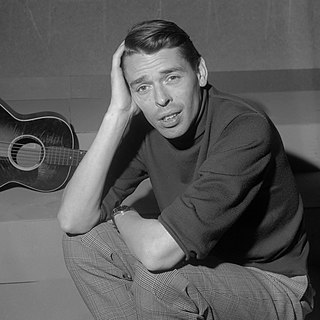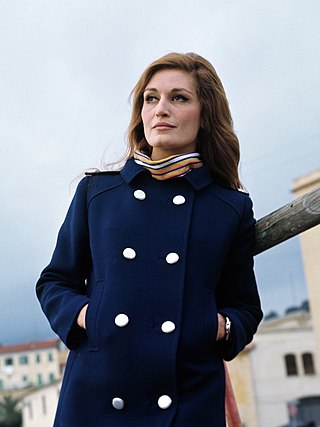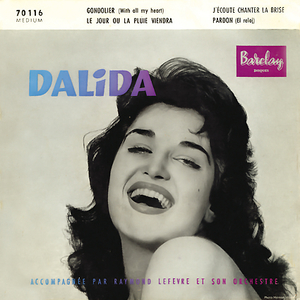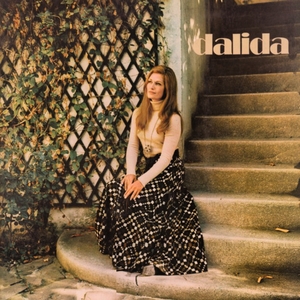
Jacques Romain Georges Brel was a Belgian singer and actor who composed and performed theatrical songs. He generated a large, devoted following—initially in Belgium and France, but later throughout the world. He is considered a master of the modern chanson.

Iolanda Cristina Gigliotti, professionally known as Dalida, was an Italian naturalized French singer and actress. Leading an international career, Dalida has sold over 140 million records worldwide. Her best known songs include "Bambino", "Gondolier", "Les Enfants du Pirée", "Le Temps des fleurs", "Darla dirladada", "J'attendrai", "La Danse de Zorba", "Bang Bang", "Il venait d'avoir 18 ans", "Le Jour où la pluie viendra", "Gigi l'amoroso", "Laissez-moi danser", "Salama ya salama", "Helwa ya baladi", "Mourir sur scène" and "Paroles, paroles" featuring spoken word by Alain Delon.

Georges Charles Brassens was a French singer-songwriter and poet.

Michel Charles Sardou is a French singer and occasional actor.

Son nom est Dalida is the debut studio album by French vocalist Dalida. It was released in December 1956 through Barclay Records.

"Gondolier" is a song by the French singer Dalida, first released on EP in December 1957. It was her second major hit after "Bambino". Reaching No. 1 on both the La Bourse des Chansons chart and the Music Hall chart in France, it was the title song for Dalida's 1958 album Gondolier. The song also reached No. 1 on the Belgian and Canadian charts.

"Paroles, paroles", also given as "Paroles... Paroles...", is a song by French singer Dalida featuring French actor Alain Delon, with music by Gianni Ferrio and lyrics by Michaële, released on 17 January 1973 as the lead single from Dalida's upcoming album Julien (1973). It is a cover of the 1972 Italian song "Parole parole", originally performed by Mina and Alberto Lupo.

Ma mère me disait is the last Dalida album from the 1960s. It includes the hits "L'an 2005" and "Les couleurs de l'amour". Like the previous album, Le temps des fleurs, the songs are more melancholic and mostly ballads.

This album of Dalida coincided with several changes in her career: the 1970s were coming, her label was no longer Barclay Records but her brother Orlando's International Shows, and she was also changing her style to a more mature adult contemporary music. The success of this album is the proof, exemplified by the Greek folkloric summer hit "Darla dirladada", "Ils ont changé ma chanson," and "Lady d'Arbanville".

Marie Laforêt was a French singer and actress, particularly well known for her work during the 1960s and 1970s. In 1978, she moved to Geneva, and acquired Swiss citizenship.

"Bambino" is a song recorded by Italian-French singer Dalida that became her first major hit. It was first released on 28 October 1956 as the title song of her third EP, prior to her debut album Son nom est Dalida, where it was also included. It is a French version of the Neapolitan song "Guaglione".
"The Way of Love" is a song written by Jacques ("Jack") Dieval, with English lyrics by Al Stillman. It was originally a 1960 French song titled "J'ai le mal de toi", and it was first recorded in English by Kathy Kirby in 1965. The best-known English version was by Cher whose recording reached No. 7 in the US.

Raymond Lefèvre was a French easy listening orchestra leader, arranger and composer.

Les Poppys is a French musical group of 17 children founded 1946 in Asnières, France by Jean Amoureux as Les Petits Chanteurs d'Asnières and renamed to Les Poppys in 1970. Francois Bernheim, former singer of the group Les Roche-Martin and artistic director for the record company Barclay, discovered the singers in 1970 and decided to create a group called Les Poppys, named after the word 'Pop Music'.

"Le Temps des fleurs" is a song by French singer Dalida for her twenty-first studio album of the same name. While the French lyrics were written by Eddy Marnay, the melody was taken from Russian romance song "Dorogoi dlinnoyu", composed by Boris Fomin in 1924. Dalida covered the song after Mary Hopkin had a hit with her English version "Those Were the Days" one month earlier.
"Rain and Tears" is a song by the Greek band Aphrodite's Child. The song was included on the band's 1968 debut studio album End of the World, and was released as a single in July 1968 on Mercury Records. It became a major hit across Europe, reaching number one in France, number two in several other countries, and entering the top 30 in the United Kingdom and West Germany.
"The Day the Rains Came" or "Am Tag als der Regen kam" or "La pioggia cadrà" is an adaptation of the French song "Le Jour où la pluie viendra". The latter is a popular song released in 1957, composed and written by Gilbert Bécaud and Pierre Delanoë.

Love in Portofino is the sixth and last studio album of 1950s by French singer Dalida. It was released in December 1959 through Barclay Records.

"Dans la ville endormie" is a French language song recorded by singer Dalida, first released on EP during summer of 1968. It is the product of Dalida's collaboration with composer William Sheller with whom she worked on Le temps des fleurs, her album released later that year. English language cover "My year is a day" by Les Irrésistibles achieved success several months later.
















